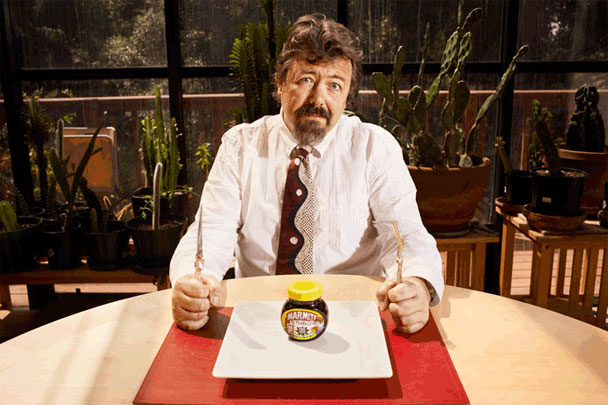The last time I came back to America from England I got pulled over by security at Heathrow because the x-ray machine had detected something suspicious in my hand luggage. My bag was unpacked and out came the offending article, a jar of English mint sauce. The English security man looked at it and me sternly, and pointed out that since the sauce was runny and the jar was large, I was breaking the rules about how much liquid could be taken on planes. Of course, if I’d thought about it even for a moment I would have realized this, but the need for mint sauce had clouded my judgment.
The security man softened a little and looked at me with sympathy rather than hostility, as though I was an idiot rather than a threat. I certainly expected him to confiscate the jar, but I found myself explaining that I was an Englishman living in California and it was hard to get authentic mint sauce there. The man’s face cracked the smallest of smiles, “Well,” he said, “an Englishman can’t have his roast lamb without mint sauce can he?” I agreed that he couldn’t, and I was then waved through, taking my jar with me, having experienced a rare example of commonsense and cultural solidarity while traveling by air.
In general I’m not one of those Englishmen who lives in America and spends a lot of time feeling nostalgic about warm beer and Marmite sandwiches, but there are moments when I crave a Fortnum and Mason’s hand raised pork pie, some good English piccalilli, a nice pair of kippers and so on, and I’m clearly not alone in this. There’s a very curious scene in Raymond Chandler’s novel The Long Goodbye, in which Philip Marlowe, the tarnished yet noble private eye, has some thinking to do. He decides he needs prime rib and Yorkshire pudding, and goes to a Los Angeles restaurant called Lowry’s. Now I would have thought Marlowe was far too tough and all-American to be a Yorkshire pudding kind of guy. Great though it is, Yorkshire pudding seems a little too soft, frivolous and British for a hard bitten gumshoe, and this fictional moment just doesn’t ring true in the book. And I seems to me it was the author, Chandler, partly raised in England and very much an Anglophile, who was craving some British nosh, and placed the urge on his fictional hero. It’s hard to blame him.
There is no restaurant in L.A. called Lowry’s, and as far as I can tell there never was, but there is one called Lawry’s, and it certainly existed in Chandler’s time, though its location has moved since then. There you can indeed get prime rib and Yorkshire pudding, although in my experience the majority of the customers are unsure what a Yorkshire pudding is or how to eat it. Quite a high percentage of the puddings return to the kitchen untouched, which is a terrible shame. The interaction of well-beaten batter and sizzling hot beef fat in oven is one of British cookery’s most delicious and mystical processes. Lawry’s can certainly satisfy some of my yearnings for British food, and if it isn’t exactly a taste of home, it’s a decent approximation.
In fact Lawry’s, a small chain that now extends to Dallas, Las Vegas and Chicago, as well as outside America, is a respectful though not especially accurate, imitation of the classic London restaurant, Simpson’s in the Strand. The story goes that Lawrence L. Frank, the begetter of Lawry’s, never visited Simpson’s, but he heard reports that they carved beef tableside from grand silver trolleys, and this led him to create a version from his own imagination. I wouldn’t be the first to say that the imitation is rather better than the original.
Lawry’s doesn’t advertise itself as serving British food per se, and it’s not hard to see why. All Americans “know” how terrible British food is. They accuse it of being both bland and disgusting, not an easy trick to pull off. And the claim is that the food’s not just bad, but downright laughable. The jokes probably didn’t start with Mark Twain whose recipe for “New English Pie” involves a bullet-proof dough, several days of cooking and then petrifaction. And it certainly didn’t end with the Simpsons’ Mutton Chop Murderer episode, set in Victorian England, in which the killer is caught through his love of eel pies.
Old jokes and stereotypes die hard. The obvious way to counter them is to say that British food has seen huge changes and improvements in recent years. This is perfectly true, although I admit we British remain deeply attached to some quaint old delicacies such as spotted dick, toad in the hole and mushy peas, things that are never going to become hot favorites on American menus. But the biggest change of all is that the British, who once thought it was effete and unmanly to care what they put in their mouths, are now proud of their own gastronomic passions and connoisseurship.
The other way the British might counter the casual abuse of their national cuisine is to ask why, if Americans hate British food so much, they have such a love affair with British chefs. Jamie Oliver’s TV show Food Revolution just won an Emmy. Heston Blumenthal of the Fat Duck is about to be feted at the York City Wine & Food Festival. Fergus Henderson’s book Nose to Tail Eating, subtitled “a kind of British Cooking” was a smash hit with the pig’s trotter and marrowbone crowd. And there are times when it seems impossible to turn on a TV without seeing Gordon Ramsay joyfully cussing and calling people donkeys.



 Pinterest
Pinterest


